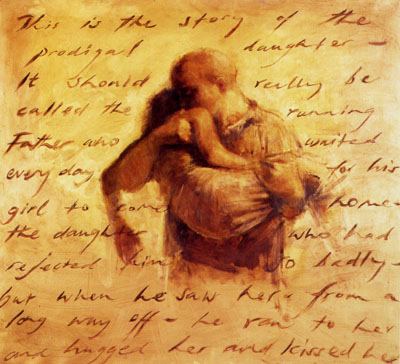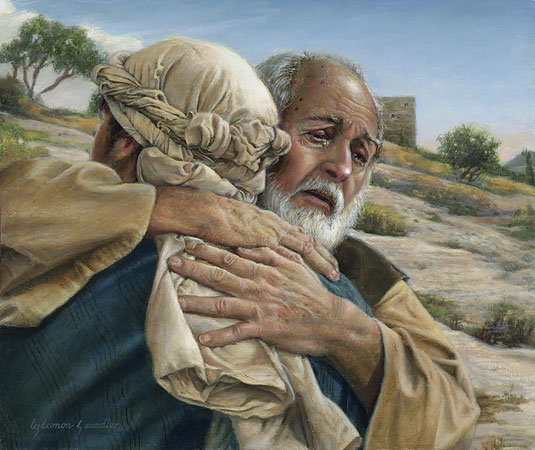Sunday Lectionary: A God who goes looking…
 Below is a reworked version of a reflection I first presented at Cheltenham’s Week of Prayer for Christian Unity on 26th January 2008…
Below is a reworked version of a reflection I first presented at Cheltenham’s Week of Prayer for Christian Unity on 26th January 2008…
Now the tax collectors and “sinners” were all gathering around to hear [Jesus]. But the Pharisees and the teachers of the law muttered, “This man welcomes sinners and eats with them.” …
Jesus said: “There was a man who had two sons. The younger one said to his father, ‘Father, give me my share of the estate.’ So he divided his property between them. Soon after, that son got together all he had, set off for a distant country where he squandered his wealth in wild living.
After he had spent everything, there was a severe famine in that whole country, and he began to be in need. So he went and hired himself out to a citizen of that country, who sent him to his fields to feed pigs. He longed to fill his stomach with the pods that the pigs were eating, but no one gave him anything.
When he came to his senses, he said, ‘How many of my father’s hired men have food to spare, and here I am starving to death! I will set out and go back to my father and say to him: Father, I have sinned against heaven and against you. I am no longer worthy to be called your son; make me like one of your hired men.’
So he got up and went to his father. But while he was still a long way off, his father saw him and was filled with compassion for him; he ran to his son, threw his arms around him and kissed him. The son said ‘Father, I have sinned against heaven and against you. I am no longer worthy to be called your son.’But the father said to his servants, ‘Quick! Bring the best robe and put it on him. Put a ring on his finger and sandals on his feet. Bring the fattened calf and kill it. Let’s feast and celebrate.
The older brother was angry and refused to go into the house. So his father went out and pleaded with him. But he answered his father, ‘Look! All these years I’ve been slaving for you and never disobeyed your orders. Yet you never gave me even a young goat so I could celebrate with my friends. But when this son of yours who has squandered your property with prostitutes comes home, you kill the fattened calf for him!’ ‘My son,’ the father said, ‘you are always with me, and everything I have is yours. But we had to celebrate and be glad, because this brother of yours was dead and is alive again; he was lost and is found.'” – Luke 15:1-2, 11-32
In trouble again…
Jesus had, as usual, been receiving criticism from the Pharisees. The Pharisees were one of the three major religious societies within Judaism at the time of the Jesus and had an almost unparalleled zeal and dedicated themselves to following the religious law to its very letter. What appalled them was that Jesus, someone who they could see was holy, was “polluting himself” by hanging out and eating with people that they regarded as being “sinners”. Jesus answered his critics in a way he often did – by telling them a story – a story about our failings, our judgementalism and about God’s forgiveness.
I don’t need you
The story begins with a younger son demanding his share of the estate from his father. Could you imagine telling your parents that you couldn’t wait for them to die and that you wanted to receive the contents of their will now? Well, That is what this son did. This son then takes everything he has and moves as far away from his family as he can get. Imagine how all these things would have hurt the father, but even so, he gives the son the freedom to do all this – the freedom to reject him.
After a couple of years that were probably pretty wild, it all goes wrong. The son has lost everything – property, wealth, friends… He takes a job looking after some foreigner’s pigs – an unpleasant job at the best of times, but for a Jew doubly revolting as pigs were considered to be ritually unclean. The son eventually comes to his senses and realises that he would be better off working for his father as a servant than slowly starving to death in a foreign country.
“Better is one day in your courts than a thousand elsewhere; I would rather be a doorkeeper in the house of my God than dwell in the tents of the wicked.” – Psalm 84:10
It’s interesting to note here the son’s motivation. Was he sorry he had hurt his father? Well, probably…but that isn’t what drives him back, though. He heads back to his father because he knows that with him he’ll be safe.
While he was still a long way off…
Next we hear one of the most beautiful passages of scripture: The father didn’t even wait until the son had arrived at the house! We’re told that while he was little more than just a dot on the horizon, “his father saw him and was filled with compassion for him; he ran to his son, threw his arms around him and kissed him”. Now remember that the last job this boy had was looking after pigs… I don’t think his smell would have improved by the long journey home on foot! But even so, the father hugs him and kisses him.
On the way home the son would, no doubt, have been preparing the little speech he was going to make to his father (“Father, I’ve sinned against heaven and you…”), but when he arrives he doesn’t even get time to say it all as his father is busy organising gifts for his son: the best robe, a ring and sandles – all of which would show the world that this boy was his son. Only slaves went barefoot, free men wore sandles. The best robe showed the riches of the family to which he belonged. The signet ring showed the authority he had as the father’s son.
Although I’m he had some wild parties whilst he was in that foreign land, I’m pretty sure they didn’t compare with the joy he felt at being back in his father’s home with the smell of roasting meat in the air.
The Gospel
This is a beautiful story. The father represents God and the younger son the “sinners” Jesus had been hanging out with. It tells of God’s goodness, His forgiveness and how anyone is welcomed back whatever, what-ever, they’ve done…if they simply turn back to Him.
“…neither height nor depth, nor anything else in all creation, will be able to separate us from the love of God” – Romans 8:39
And the best part of this story is that we are included – we too can always return home to the Father.
The Brother
But the parable doesn’t end there though… We still have the matter of the older brother. In most talks I’ve heard about this passage, I always feel that the older brother gets rather harsh treatment. You have to admit he had a point!
How would you feel if a younger sibling disgraced your family, hurt your father, raided the family silver only to go and spend it all and then come back “cap in hand”? No wonder the older son was angry. No wonder he no longer regarded him as his brother, only referring to him as “this son of yours“. The older son had a valid case. He wanted to see the younger son punished. He wanted to see justice done.
But here is the point Jesus was trying to get across. This is exactly what is so amazing about “amazing grace”: it is undeserved, it is not earned and it is freely given – it just has to be accepted. The older son resented the goodness, mercy and the generosity of the father towards the younger son. The younger son had done some terrible things, but it didn’t matter to the father: he was just so pleased to have him back safe and sound: “this brother of yours was dead and is alive again” If it didn’t matter to the father, it shouldn’t have mattered to the older son.
In this story, the older brother represents the Pharisees, who were complaining about the company Jesus had been keeping. They were resentful of the generosity this holy man was extending to people who simply did not deserve Him. Jesus should have been paying attention to them – people who were “holy”, who had been seeking after God and keeping his commands…not foreigners, prostitutes, tax collectors and thieves.
Are you sitting comfortably?
Jesus didn’t just tell beautiful stories, he told stories which made people uncomfortable and challenged their prejudices. What makes this a hard story to listen to is that the modern-day Pharaisees can easily be people who go to church and call themselves “Christians”. As soon as I start thinking of a person or a group of people as “inferior”, “sinners” or “disreputable” I have made myself Judge and Jury and am on very shaky ground. The are only a few perilous steps between righteousness and self-righteousness.
Which son am I more like?
Am I like the older brother, resentful of God’s blessing on others whom I deem unworthy. Do I consider myself “better” and “more deserving” than others? Have I forgotten that I too rely on God’s goodness? It might be time to pray for forgiveness and grace.
Or Am I like the younger brother? Have I turned away from the Father and done my own thing? This may be in its totality or in a particular aspect of my life where I have demanded that my will be done, rather than His? It might be time to pray for forgiveness and grace.
Either way, it might be time to turn our faces towards home, sure in the knowledge that we won’t even be able to make it to the front door before we’ve been forgiven and find we’re being embraced by the one who loves us most of all.
